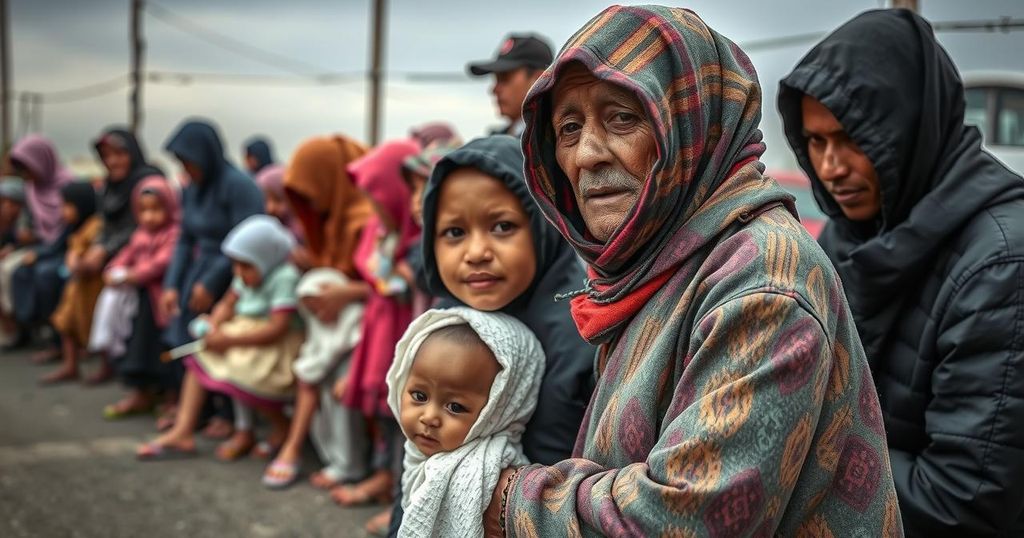UN Report Warns of Escalating Refugee Crisis Amid Climate Change and Conflict

The recent UNHCR report reveals that refugees are increasingly suffering due to the convergence of climate-related crises and violent conflicts. With 120 million displaced by conflict and 220 million due to climate disasters, urgent action and funding are required to address these escalating challenges, particularly in developing countries where the majority of refugees reside.
A recent United Nations High Commissioner for Refugees (UNHCR) report has revealed the increasing difficulties faced by refugees as they navigate the dual threats of climate change and internal conflicts. These climate shocks—such as floods, droughts, and extreme weather events—exacerbate the conditions in conflict-ridden regions such as Sudan, Somalia, and Myanmar. According to UNHCR Chief Filippo Grandi, refugees are on the forefront of this escalating crisis and are particularly vulnerable in developing countries, where around 75% of them reside. Furthermore, access to funding for adaptation is alarmingly low, with only approximately $2 per person allocated for the most fragile states, contrasting sharply with $161 in less vulnerable regions.
The findings of the report highlight that a staggering 120 million individuals have been forcibly displaced due to violent conflicts, while an estimated 220 million people have relocated within their countries due to weather-induced disasters. The past decade has witnessed soaring global temperatures, with 2023 recorded as the hottest year on record by the National Oceanic and Atmospheric Administration (NOAA). This rise in temperatures directly correlates with an increase in the frequency and severity of extreme weather events, necessitating that we prepare proactively for the repercussions of climate change.
Those residing in low-income countries are exceptionally affected as they grapple with a confluence of social upheaval and relentless climate disasters. Many are migrating to remote regions that lack adequate infrastructure to manage the impacts of climate change, leading to worsening conditions. Andrew Harper, UNHCR’s special advisor on climate action, remarked on the growing intensity of these challenges, stating that the situation is becoming increasingly dire.
Efforts to address this crisis are being undertaken, as reflected in recent discussions at COP29 in Baku, Azerbaijan, where nations pledged $300 billion by 2035 to assist the most vulnerable. Additionally, there is a broader goal to raise $1.3 trillion from various sources, including private investments. The UNHCR has set specific objectives to achieve by 2030, which include protecting vulnerable populations and promoting climate-smart services. Najeeba Wazefadost of Refugees for Climate Action emphasized the existential nature of climate change, urging global leaders to acknowledge the challenges faced by refugees and to implement supportive measures that empower these individuals.
The UNHCR highlights the intersection between climate change and conflict as a significant driver for refugee displacement. In many parts of the world, particularly in developing nations, the vulnerability to environmental shocks compounds existing conflicts, creating an urgent humanitarian crisis. The alarming statistics on displacement—both from conflicts and climate-related disasters—underscore the critical need for targeted funding and resources. As global temperatures rise, the frequency and severity of climate-related disasters are predicted to increase, necessitating a proactive approach to disaster preparedness and refugee support.
The UNHCR’s report underscores an urgent humanitarian crisis faced by refugees, driven by the dual threats of climate-induced displacement and violent conflict. With millions affected and severely limited financial resources for adaptation, immediate action is necessary. The pledges made at international gatherings, alongside the call for enhanced support for climate-driven initiatives, represent critical steps toward addressing these mounting challenges. Ultimately, collaborative efforts must be focused on both mitigating the impact of climate change and supporting those who are most vulnerable in their time of need.
Original Source: www.thecooldown.com






